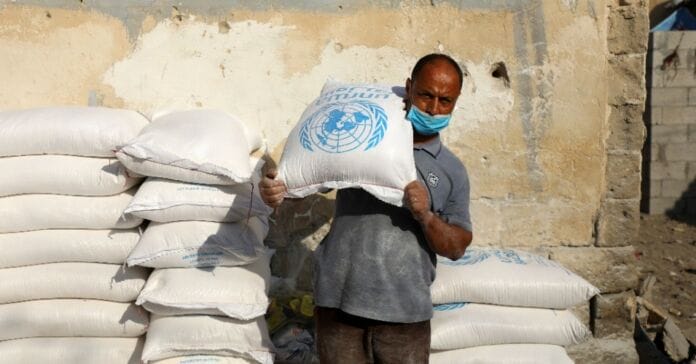
“The impact of the Covid-19 crisis on health and human mobility threatens to roll back global commitments,” said one official, “and hinder ongoing efforts to support those in need of assistance.”
by Jessica Corbett, CommonDreams.org
With global attention fixed on the forthcoming transition of power following last week’s U.S. presidential election and newly announced promising results from Pfizer’s Covid-19 vaccine trials, two United Nations agencies on Tuesday highlighted concerns about how the coronavirus pandemic is impacting global hunger and population displacement—warning that both “could surge as people on the move and those reliant on a dwindling flow of remittances desperately seek work to support their families.”
The first-of-its-kind report from the International Organization for Migration (IOM) and the U.N. World Food Program (WFP) is entitled Populations at Risk: Implications of Covid-19 for Hunger, Migration, and Displacement (pdf). It comes as the number of cases across the globe nears 51 million and after more than 1.26 million deaths.
The report examines recent migration trends; the pandemic’s impact on migrant workers, remittance-dependent households, and forcibly displaced persons; growing risks to people on the move; and food security trends in major migration and hunger hotspots. It also details recommended actions for the international community.
Agency leaders note in the report’s foreword that “the pandemic has hit at a time when hunger has been on the rise over four consecutive years, mainly due to conflict, climate-related shocks, and economic crises. At the same time, forced displacement has reached record highs.”
As Common Dreams has reported, the U.N. Refugee Agency revealed in June that an unprecedented 79.5 million people worldwide were forcibly displaced by the end of last year, including 26 million refugees, 45.7 million internally displaced persons (IDPs), 4.2 million asylum-seekers, and 3.6 million Venezuelans displaced abroad. A September analysis from an international think tank predicted that ecological disasters and armed conflicts could forcibly displace 10% of humanity, or about 1.2 billion people, by 2050.
Those findings came in the midst of the ongoing public health crisis, but the new WFP-IOM report specifically focuses on it. The foreword says that “while overall mobility is expected to decline in 2020 due to the pandemic, it may ultimately increase over time as more people will be compelled to move if they can no longer make ends meet in their current location. Thus, well-governed migration, as outlined by the United Nations Network on Migration, is an essential component of an effective response to Covid-19.”
“The report is fully grounded in the vision of the Global Compact for Safe, Orderly, and Regular Migration, which underscores that migration should never be an act of desperation,” write Arif Husain, chief economist and director of research at WFP’s Assessment and Monitoring Division, and Jeffrey Labovitz, director of IOM’s Department of Operations and Emergencies. “Migrants and displaced populations facing acute hardship due to Covid-19 must be provided with support that enables them to meet their food and other essential needs.”
IOM Director-General António Vitorino warned in a statement that “the impact of the Covid-19 crisis on health and human mobility threatens to roll back global commitments, including for the Global Compact on Migration, and hinder ongoing efforts to support those in need of assistance. It is our collective responsibility to safeguard the rights of people on the move and ensure their protection from further harm.”
Specifically, the report offers eight recommendations to global community:
- Ensure migrants facing acute hardship can access humanitarian assistance in order to meet their food and other essential needs.
- Safeguard assistance provided to the displaced and their host communities, including refugees, and asylum seekers, IDPs, as well as migrants in crisis situations and those in mixed flows.
- Secure access to critical services and inclusive information for all mobile and displaced populations.
- Recognize the positive contributions of migrants and diaspora and promote their inclusion in social protection systems.
- Facilitate the flow of remittances as an essential financial service that supports the response to and recovery from the impact of Covid-19.
- Promote necessary adjustments to national legal frameworks and ensure access to legal services.
- Counter xenophobia, stigmatization, and discrimination towards people on the move in the wake of Covid-19.
- Improve data and analysis to better understand the impacts of Covid-19 on mobility, remittances, and food security dynamics.
“The socio-economic impact of the pandemic is more devastating than the disease itself,” said WFP Executive Director David Beasley. “Many people in low- and middle-income countries, who a few months ago were poor but just about getting by, now find their livelihoods have been destroyed. Remittances sent from workers abroad to their families at home have also dried up, causing immense hardship. As a result, hunger rates are sky-rocketing around the world.”
Last week, the WFP issued a report with the Food and Agriculture Organization (FAO) which “describes a toxic combination of conflict, economic decline, climate extremes, and the Covid-19 pandemic that is driving people further into the emergency phase of food insecurity,” according to a joint statement from the U.N. agencies.
The WFP and FAO called for urgent global aid to address the rising risk of famine in four food insecurity “hotspots” within Burkina Faso, northeastern Nigeria, South Sudan, and Yemen, as well as hunger levels across 16 countries. As Margot van der Velden, WFP’s director of emergencies, put it: “We are at a catastrophic turning point.”
“This report is a clear call to urgent action,” Dominique Burgeon, FAO’s director of emergencies and resilience, said Friday. “We are deeply concerned about the combined impact of several crises which are eroding people’s ability to produce and access food, leaving them more and more at risk of the most extreme hunger. We need access to these populations to ensure they have food and the means to produce food and improve their livelihoods to prevent a worst-case scenario.”

